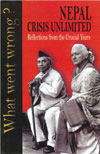The cover of Barbara Adam's Nepal: Crisis Unlimited depicts a visibly frail Ganesh Man Singh sitting uncomfortably behind an imperious-looking white woman in a sari.
The woman is Barbara Adams, who has been such a fixture in Kathmandu that the publisher didn't even deem it necessary to put the author's name on the cover.
Barbara arrived in Kathmandu in the swinging sixties: democracy had just been crushed, King Mahendra was well on his way to setting up the partyless Panchayat system. The business and political elite was one and the same and everyone knew everyone else. Hash was legal, Kathmandu had one manually controlled traffic light and taxis were painted in tiger stripes.
Barbara met Prince Basundhara, Mahendra's brother, whose reputation in the sixties matched those of Dhirendra in the eighties and Paras in the nineties. Barbara became his consort, went on hunting trips, developed a taste for expensive trinkets and ran a travel agency.
Barbara tries her best to sound sincere. She lashes out at all critics and those who deny her wishes with the ferocity of a cornered cat. Girija Prasad Koirala, who deported her in 2000, is singled out for special treatment. She is a fan of Ganesh Man, though, and has nothing but praise for Comrade Madhab.
Unlike the queen or kazini of Sikkim , Barbara never acquired the status she believes was rightfully hers. The bitterness shows in her trying to be fashionably leftie and demonstratively democratic, but the socialite socialism she espouses fails to stick. This is a collection of previously published columns, but it is hard to see the merit its publishers saw in regurgitating them.
The upper crust of Kathmandu society that Barbara's barbs are aimed at will probably buy this book as a form of self-flagellation. Expats will have something to talk about at their soirees. For the bored and idle English-reading classes, there may be some interesting tidbits buried in the pages. But to those interested in truly understanding Nepal, the book is neither reliable nor readable.
In comparing the unfortunate death of Madan Bhandari in a highway accident with the assassination of JFK, Barbara notes that "the young Camelot had captured the imagination of a generation of American youths, who had been turned off politics by the sleaze and perfidy of the Nixon Administration". Wait a minute, didn't Kennedy precede Nixon? The book is riddled with inaccuracies, contradictions and bizarrely inconsistent spelling of Nepali names. Barbara may be unable to spell, but what about the editors at Adroit?
Readers are repeatedly told by considerate reviewers not to judge a book by the cover. But the picture on the cover of this volume captures the very essence of what's inside.
CK Lal

Nepal: Crisis Unlimited
By Barbara Adams
Adroit, New Delhi, 2006
pp 341
Rs 800


